Nov 19, 2025 – Weekly Dharma Assembly, Peace Research Seminar
Hello. Today is the day of the Weekly Dharma Assembly, where Jungto Society members examine their practice.
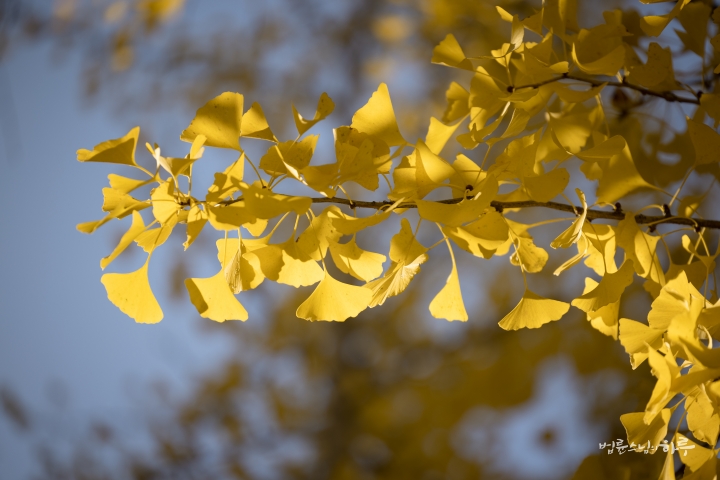
After completing morning practice and meditation, Sunim headed to the Jungto Social and Cultural Center for the Weekly Dharma Assembly.
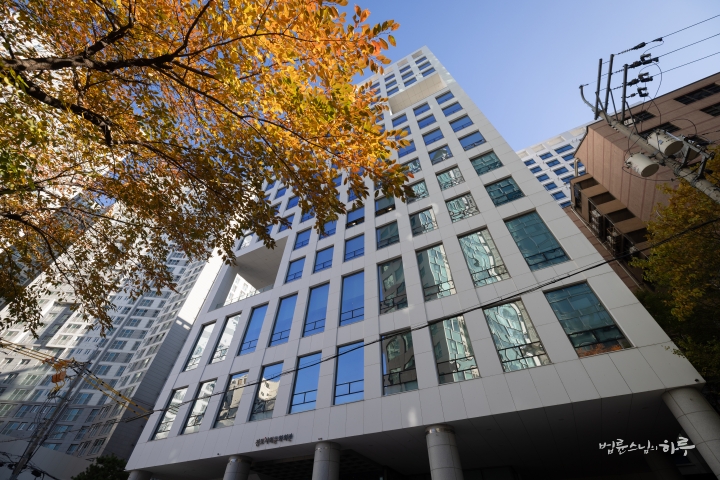
About 100 members of the Sangha had gathered in the Dharma Hall on the third floor. At 10 AM, the Weekly Dharma Assembly began with the Three Refuges and the Heart Sutra recitation. Jungto Society members joined the assembly online by connecting to the video conference room.
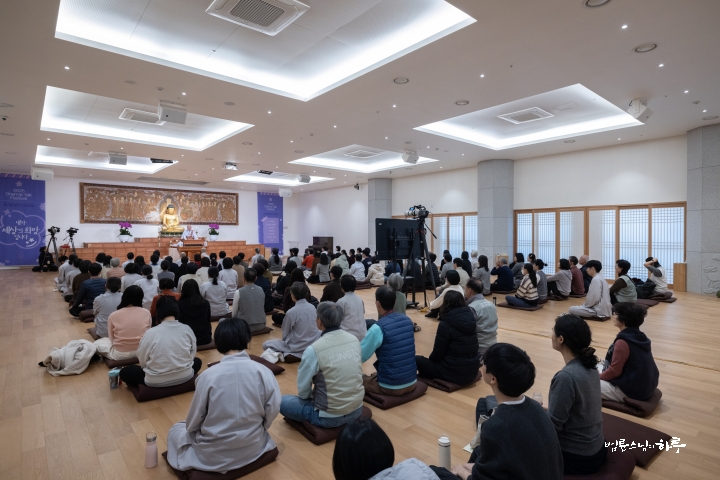
After watching a video about the weekly news of Jungto practitioners, the assembled members requested a Dharma talk from Sunim with three prostrations. First, Sunim gave opening remarks. He provided information about the upcoming First 1000-Day Practice Closing Retreat and spoke about the significance of Jungto Society’s activities, which have transcended faith-based religion to cultivate personal happiness and practice social values.
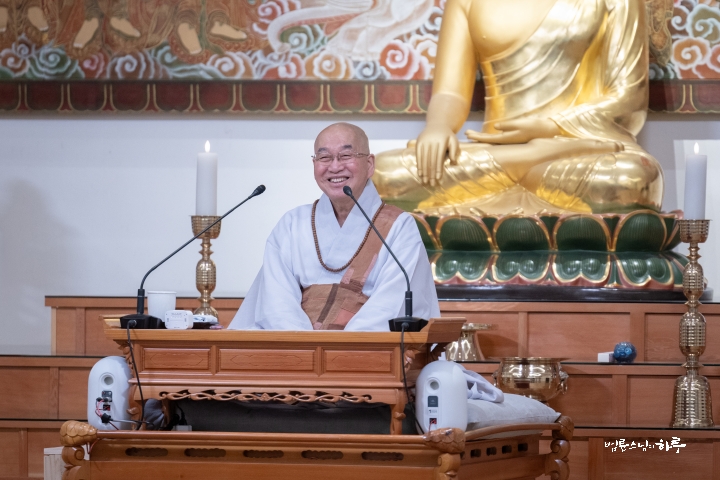
“November is already passing its midpoint. With the sudden cold, early winter seems to have arrived quickly. The year-end when we must wrap up 2025 is right around the corner, and in four weeks, Jungto Society will complete the 1000-Day Practice prayer that has continued for the past three years.
What We Need Now Is the ‘New Mind Movement’
Jungto Society does not emphasize religious materialism such as ‘if you pray, you’ll go to a good place after death.’ Globally, such materialistic religious practices are gradually declining and being pushed out of humanity’s main concerns. Of course, in the United States, conservative Christian forces combine with extreme political actions to cause significant confusion in international society, and in some developing countries, religion still exerts strong influence by combining with feudal values. However, in most democratized societies, religion is no longer a central concern, and its influence is rapidly weakening. Now religion can be said to remain merely as an element of culture. This doesn’t mean people are turning away from spiritual values. They simply no longer rely on materialistic religion as before, and this tendency is particularly pronounced among younger generations.

Jungto Society foresaw this trend over 30 years ago and has consistently practiced environmental protection, peace, and sharing while placing the value of practice at the center. In this regard, the values pursued by Jungto Society can be said to stand at the forefront of humanity’s universal values today. Particularly, if the Happiness School and Happy Citizens Movement become well-established among the people, they will become an important foundation for resetting Korean society. In the 1970s, during times of severe economic hardship, there was the Saemaul (New Village) Movement where all citizens voluntarily participated with the spirit of ‘Let’s live well too’ and established the foundation of the nation. Now is the time when we need a new ‘Saemaeum (New Mind) Movement’ with the spirit of ‘We cultivate our own happiness.’ If the Awakening Retreat and Jungto Dharma School are programs that help people understand Buddhism more easily and correctly, the Happiness School will become an excellent model and social movement that transcends Buddhist formalities and enables anyone to move toward happiness.
While it’s important for you to practice becoming happy yourself, it’s also very meaningful to recommend Jungto Dharma School or Happiness School to people around you according to their situations. By doing so, they too can encounter good teachings, escape from wandering, and live happily and meaningfully even if just for a day. I want to emphasize how important this activity is.”
Next, Sunim received questions from those who had registered in advance. Two people asked questions online. One of them shared their confusion about unexpected emotions that arose upon hearing news of their mother’s critical condition, with whom they had been estranged for a long time, and asked how to view these feelings.

Hearing News of My Critically Ill Mother Made Me Feel Happy. Why Did I Feel This Way?
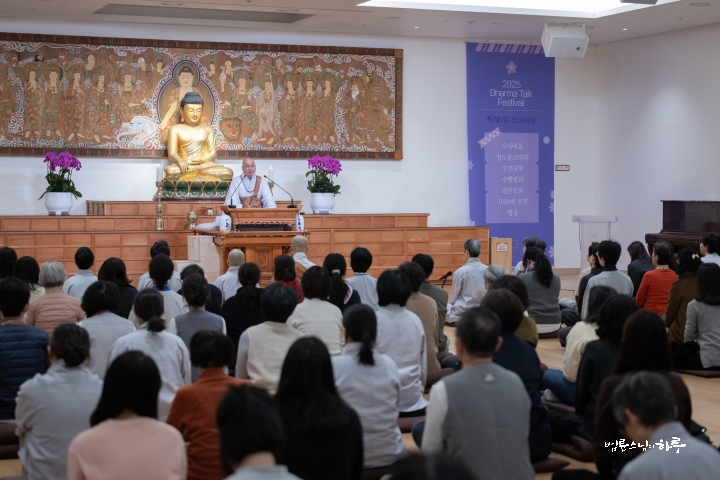
“First, hearing such news means you received a kind of stimulus. If you saw with your eyes, it’s visual; if you heard a sound, it’s auditory; if you smelled something, it’s olfactory; if you tasted something, it’s gustatory; if there was contact, it’s tactile; and including thoughts in your mind – you receive stimuli through these six senses.
When you receive a stimulus, the total habits of your life so far, that is, karma, automatically create a reaction. No matter how much you should feel sad, laughter can come out, and no matter how much you should laugh, tears can flow. There’s no need to judge these reactions as ‘good or bad’ or feel guilty. Just be aware that ‘there is this reaction.’ Just understand that ‘when this stimulus comes to my karma, there is a pleasant reaction.’ There’s no need to judge it as wrong or good. There’s simply the fact that there is a pleasant reaction.
However, thoughts and mental reactions are different. Thoughts mainly come from ethics, morals, and values, but mental reactions appear according to long-formed habits regardless of such things. Just as the body reacts for survival, the mind also reacts automatically. For example, when someone points a stick at me, regardless of whether they saw a snake behind me and were trying to help or were trying to attack, the body first creates a defensive reaction. Later, when you realize the person was trying to help, the reaction will change. Mental reactions are the same. That’s why we cannot judge the reactions the mind creates as good or bad.
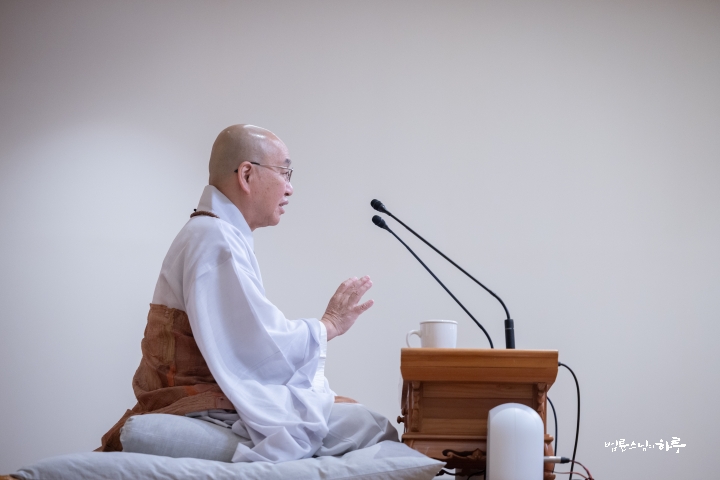
When your mother is unwell, it’s natural to feel somewhat sad, but if you experience a sense of relief, it could be due to resentment toward your mother formed during childhood. Even if you understand intellectually as an adult, childhood wounds can remain. For example, suppose someone who criticized our country from Japan or North Korea passed away. While death itself isn’t something to celebrate, you might think to yourself, ‘Good riddance.’ Similarly, if you felt relief, you can use this as an opportunity to realize, ‘I had resentment toward my mother.’ That’s all there is to it. There’s no need to feel guilty.
If you feel that harboring resentment is harmful to you, you can broaden your understanding. What seemed bad to you as a child can be seen as a choice your mother could make as a woman. Considering various circumstances such as relationships with in-laws or her husband, it was a choice that a woman in her late twenties or early thirties could reasonably make.
There are two lessons to learn here. First, wounds from childhood are difficult to understand at the time. It’s natural to think, ‘How could mom abandon me?’ However, as an adult, you can understand your mother, thinking, ‘She had no choice but to leave in such difficult circumstances.’ Second, when leaving a family, if there are children involved, you must realize that while your choice and responsibility are yours, it can wound the child. Later, when the child brings up the hurt, you shouldn’t say, ‘You don’t understand how I felt.’ Instead, you should communicate like this: ‘You were hurt then, I’m sorry. Mom was so overwhelmed that I was consumed by my own life.’
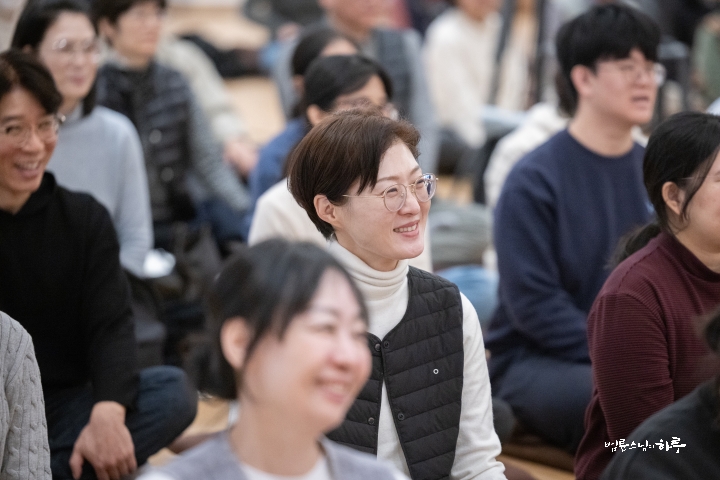
That’s why I say, ‘A mother should raise her child until the age of three,’ and ‘Try to stay together and work things out until your child becomes an adult, if possible, rather than getting divorced.’ Children cannot understand why their parents fight, and even if you explain it to them, they won’t comprehend it.
You just need to be aware of your mind’s reactions and accept them. There’s no need to feel guilty. If your mother left when you were three years old, it’s natural to feel resentment. Regardless of the reasons, resentment is a natural emotion. It’s not your fault. However, holding onto resentment only harms yourself. While it was inevitable to be hurt as a child, now as an adult, you should cultivate an understanding heart toward your mother. As you broaden your understanding, even if the resentment doesn’t disappear easily, it will gradually fade.”
“Yes, thank you.”
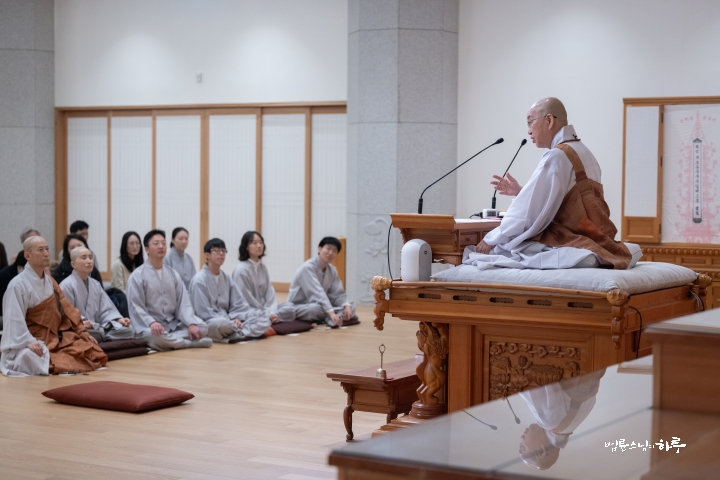
Sunim then took one more question.
An acquaintance asked me why I make donations when I’m not financially well-off. I’m curious if there’s an appropriate time for giving.
After answering the question, it was time to conclude the Dharma assembly. After watching a video about various upcoming Jungto Society events scheduled for next week, the Weekly Dharma Assembly concluded with the Four Great Vows.
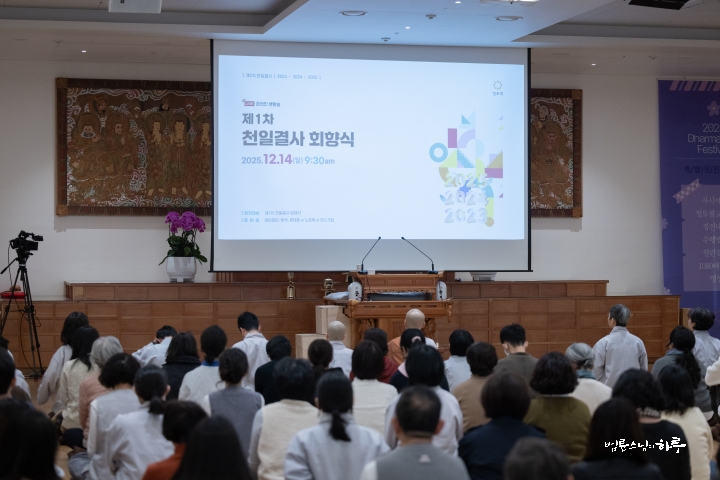
After lunch, from 1 PM, Sunim attended a Peace Foundation research seminar held in the Peace Foundation conference room on the topic of “Changes in the Arctic and Their Significance in the Arctic Ocean Era.” Today’s seminar featured an in-depth two-hour presentation by Professor Kim Seok-hwan, a visiting professor at Hankuk University of Foreign Studies.
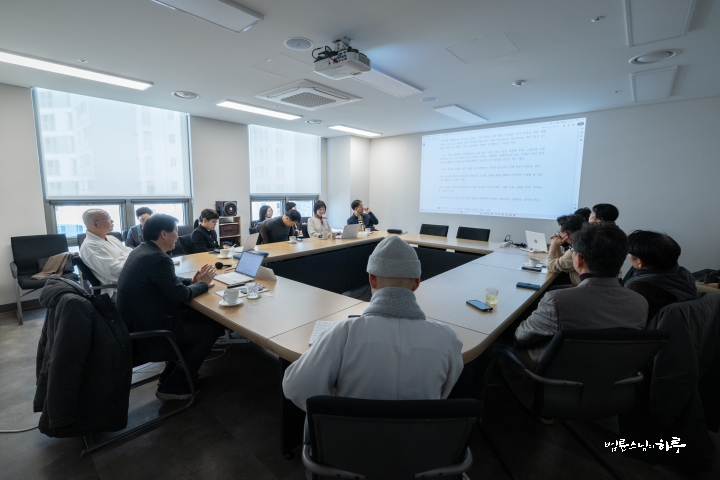
The professor explained that the Arctic Ocean era stems from accelerated ice melting due to climate change, leading to a transitional period marked by resource development, the opening of the Northern Sea Route (NSR), the establishment of sea-land integrated logistics networks, and intensified geopolitical competition among major powers. He predicted that the Arctic Ocean era would become a catalyst for a new civilizational transformation, similar to how the Aegean Sea, Mediterranean Sea, Atlantic Ocean, and Pacific Ocean eras defined world order through maritime dominance. However, he analyzed that this transformation differs from previous ones in that human-induced climate change is triggering the change.
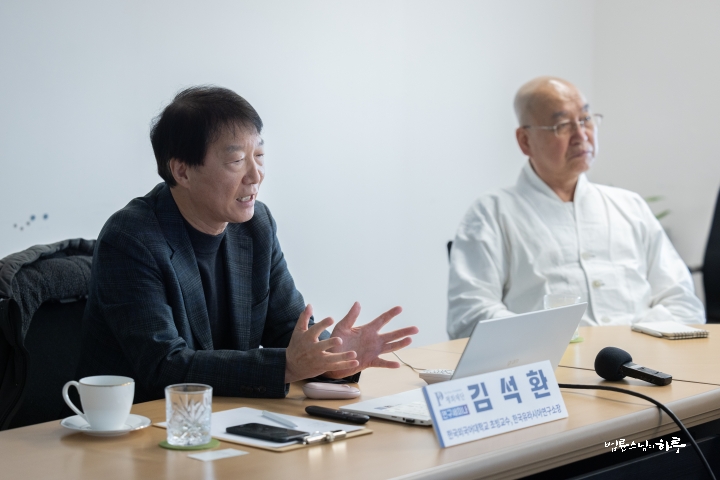
He particularly emphasized that competition between the Russia-China bloc and the US-NATO alliance is likely to intensify in the Arctic, and that Arctic resource development and NSR activation will reshape industrial landscapes in energy, logistics, shipbuilding, and environmental technology. He also stressed that Arctic ice melting will transform northern Eurasia into a new strategic space, potentially escalating military tensions, and that Korea’s east coast will simultaneously face increased economic opportunities and security risks. In this context, he suggested that Korea should actively respond to the new opportunities and challenges of the Arctic era through polar research, sustainable technology development, and participation in multilateral cooperation.
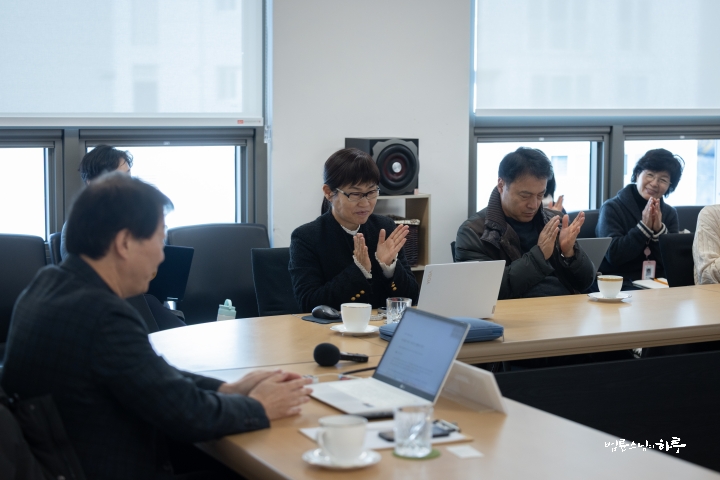
During the Q&A session following the lecture, various questions arose regarding the Arctic Ocean era. One participant asked about Korea’s icebreaker technology and the possibility of operating Arctic routes, while another pointed out the lack of inter-ministerial cooperation in implementing Arctic policies. Concerns were raised about considering the negative impacts of the climate crisis, and questions followed about how North Korea’s geopolitical position might change amid Arctic development.
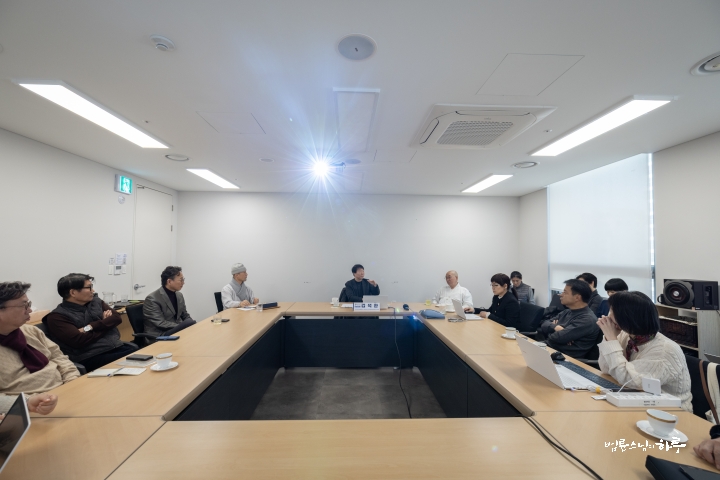
Sunim asked about the civilizational significance of the Arctic Ocean era.
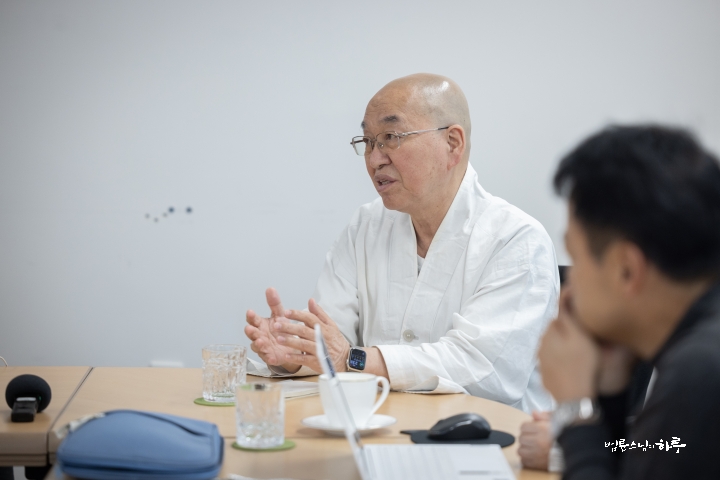
Can the Arctic Ocean Era Really Be Considered a Civilizational Transformation?
“I understand that opening Arctic routes will shorten distances to Europe, creating various logistical advantages, and that improved route accessibility will make resource development in permafrost regions much easier. I also understand the prospects that some tundra areas might emerge as new agricultural production bases due to climate change, and that fishing industries might benefit as fish species migrate north due to water temperature changes.
However, I have doubts about your comparison of these changes to ‘civilizational transformations’ like the Aegean Sea era, Mediterranean era, Atlantic era, and Pacific era. The Aegean Sea era was significant because conflicts between Greece and Persia, the centers of the world at that time, took place in the Aegean Sea. The Mediterranean era was possible because Rome became the center and civilization expanded to Greece, Egypt, Persia, and Western Europe. The Atlantic era changed the world order through the discovery of the New World connecting America and Europe, and the Pacific era created major trends through the rise of East Asia and its connection with America.
Such processes require deep connections between civilizations or shifts in the axis of world history for maritime eras to function as civilizational turning points. I’m not convinced whether the development of the Arctic Ocean can bring about changes of such magnitude. Beyond shortening logistics distances between East Asia and Europe, what factors could fundamentally connect civilizations or reorganize the world order on a global scale? The possibility of an Indian Ocean era seems more likely with the rise of India and China. I’m curious about the grounds for evaluating the Arctic Ocean era as a civilizational transformation.”
In response, Professor Kim Seok-hwan explained that the concept of the Arctic Ocean era goes beyond simple route development and represents a civilizational event where climate change fundamentally reorganizes the spatial structure of human activities. Just as the internet created new realms of human activity at the boundary between invention and discovery, the Arctic space opened by ice melting enables new connections and activities beyond existing geographical imagination.

He explained that since climate change affects not only humans but the entire Earth’s ecology, Arctic changes should be understood as a catalyst for massive civilizational transformation that simultaneously holds possibilities for both utopia and dystopia.
Sunim then asked an additional question about the possibility of reorganizing agricultural maps due to climate change.
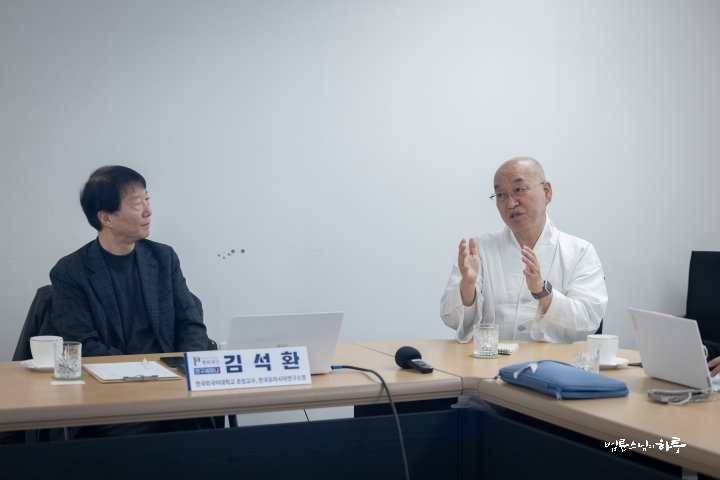
Could New Agricultural Zones Open Up Amid the Climate Crisis?
“The negative impacts of the climate crisis are already clearly evident in many places. However, I think there’s also a possibility that rising temperatures could create new agricultural zones. For example, in the United States, areas near the Rocky Mountains were once wastelands, but as irrigation technology using groundwater expanded, cultivable areas gradually extended westward. I’m curious whether regions like Siberian tundra or parts of northern Canada might be transformed into new agricultural zones where wheat farming becomes possible due to rising temperatures.
I recently visited Pakistan, where the melting of permanent snow in the Himalayas has lowered the Indus River water level, causing the long-maintained irrigation canal system to malfunction and turning vast farmlands into wastelands. In countries like Bangladesh, when river levels drop, seawater flows upstream, covering plains with salt and making farming impossible. As existing agricultural zones rapidly decline due to the climate crisis, I think the possibility of northern regions, where farming was previously difficult, transforming into new food production areas is a very important issue. So I’d like to ask: Are countries like Russia and Canada actually conducting research on the possibility of converting their northern regions into future agricultural bases as temperatures rise? And could such changes become a new alternative to solving the global food crisis?”
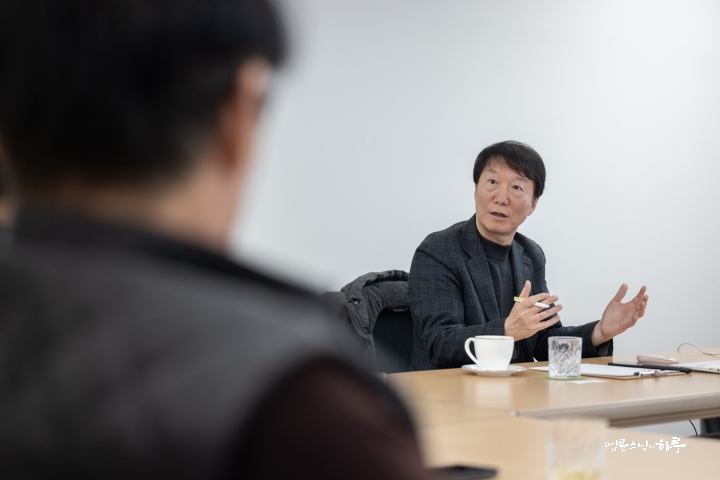
Professor Kim explained that food security is a core area of national strategy, and that Russia and Canada are already establishing long-term strategies with post-climate change agricultural maps in mind. He revealed that Russia, while banning GMOs, is strengthening its own variety improvement and pest research, and is building food and settlement strategies that utilize rising temperatures along the Arctic coast. Development of the trans-Arctic corridor connecting the Arctic and Siberia is underway, centered on the Yenisei, Lena, and Ob river basins, which he assessed has high potential to function as a new agricultural, settlement, and logistics axis. He also explained that as climate change reshapes the agricultural landscape, the northward shift of food production is becoming a reality, and the resulting population migration and new industrial and urban strategies are already being discussed among major powers.
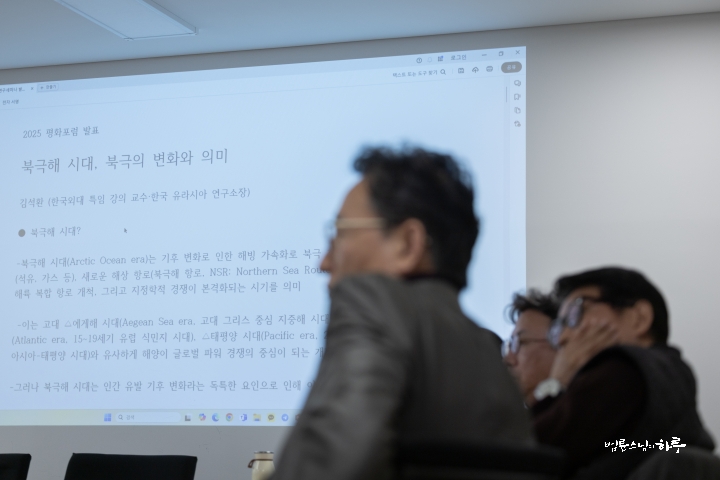
Though brief, it was an opportunity to explore various challenges posed by the Arctic Ocean era through wide-ranging topics including industry, policy, climate, and international politics. The presentations and discussions continued for three hours. As 4 PM approached, everyone took a commemorative photo together and concluded the seminar.
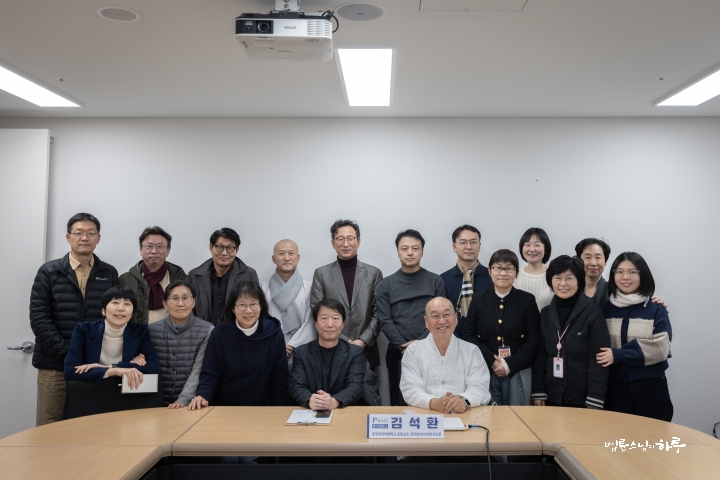
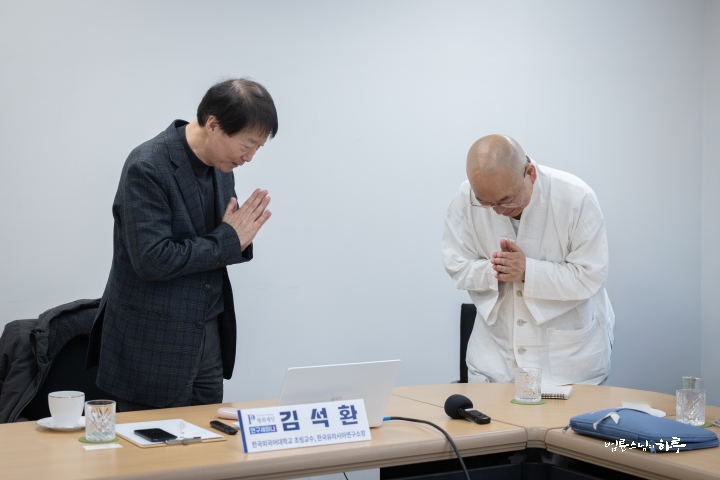
After expressing his gratitude to Professor Kim Seok-hwan, Sunim immediately attended the Peace Foundation Planning Committee meeting. After exploring prospects for improving North Korea-US relations, they discussed how to improve the increasingly severe confrontation between ruling and opposition parties and what role the Peace Foundation should play, then concluded the meeting.
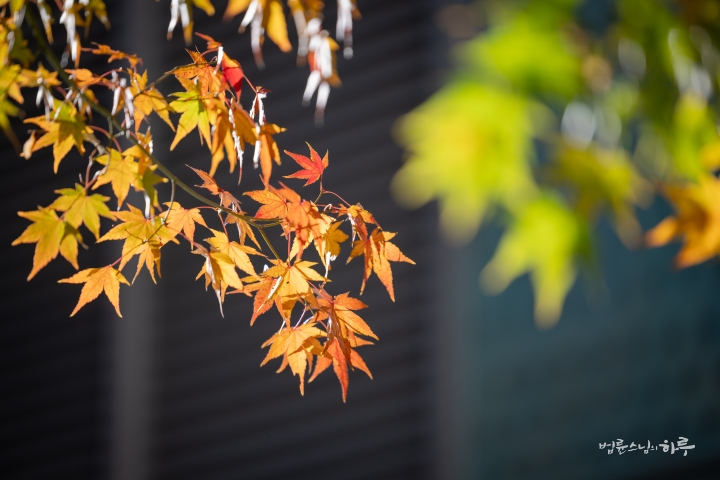
As the sun set, at 7:30 PM, Sunim conducted a live broadcast of the evening Weekly Dharma Assembly. About 80 members of the Sangha were seated in the third-floor Dharma Hall, while Jungto Society members connected through online video conferencing.
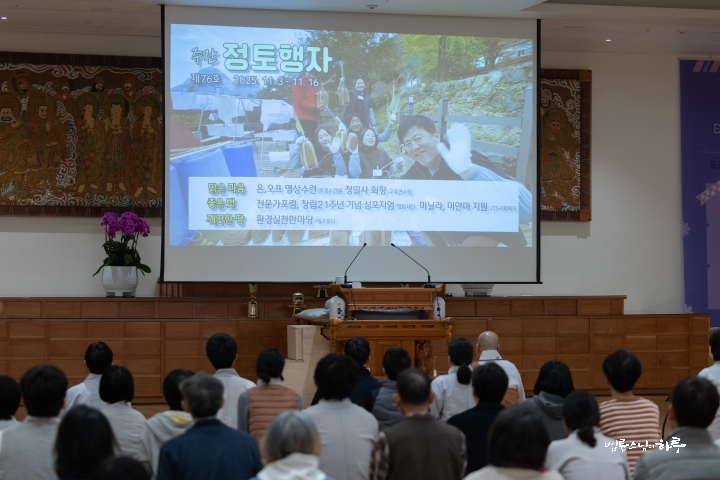
After watching a video about weekly Jungto practitioners’ news together, the assembly requested a Dharma talk from Sunim with three prostrations. Like in the morning assembly, Sunim began the dialogue after mentioning the suddenly cold weather and urging many members to participate in the upcoming First 1000-Day Practice Closing Retreat.
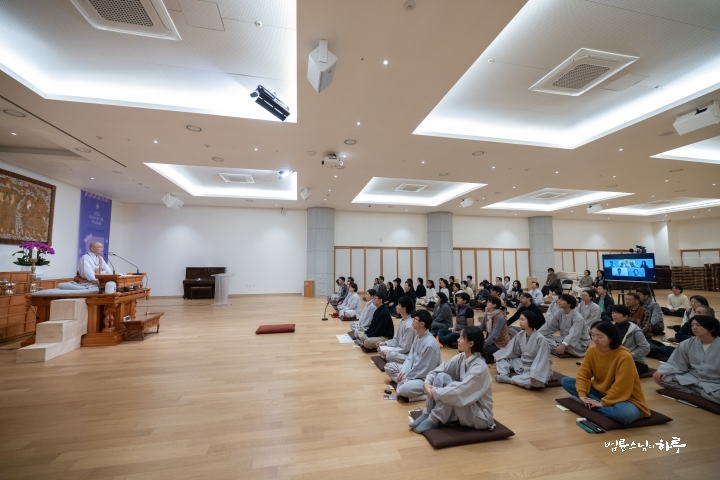
“Soon, when kimchi-making season ends, the autumn fields will become even more desolate. Right now, we can see some green here and there with radishes and cabbages, but after kimchi-making is done, only barren fields will remain. As the year comes to an end like this and the long winter passes, spring will begin again. There’s an old saying that annual plants don’t know spring will come next year, and mayflies don’t know the sun will rise again tomorrow morning. When we view life too narrowly, our current mistakes or things that don’t go as planned can feel like the end of our lives. But looking back, they’re really not that significant. Life continues the next day, and the day after that as well.
To Avoid Being Shaken by Each Day, Take a Longer View of Life
If we look at each fleeting moment, there are successes and failures, but when we take a longer view, rather than dividing them into success and failure, we can see them as part of life’s process. Instead of becoming exhausted by being too attached to each day, it’s better to accept various events as simply things that happen in the course of ongoing life. Even earth-shattering events like a family member having an accident or dying become just one part of life’s process once they’ve passed. Needless to say, this applies even more to minor matters.
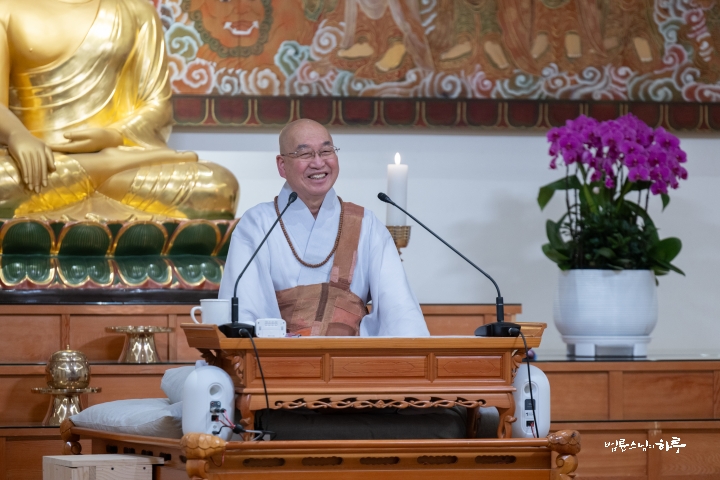
From ancient times, harboring lofty ambitions and dreaming of success in government service has been the thinking of youth. When one becomes elderly after various experiences and looks back, the Buddha’s teachings naturally become understandable. Even in the Joseon Dynasty, there was a saying: ‘Study Confucianism when young, practice Buddhism when old.’ Of course, how wonderful it would be to know life is like this in advance. Then we could live with more ease even when young. But just knowing it intellectually doesn’t make it work well. Through repeated experiences, we come to realize firsthand, ‘Ah, none of this is really that important.’
In today’s rapidly changing daily life, it’s not easy to remain clearly aware. However, if we take a longer view and step back a bit, these changes can actually feel interesting. People say they like places like Hawaii where it’s warm and cool all year round. But when you actually ask people living in Hawaii, they say it’s too boring. They say they don’t really notice time passing. On the other hand, while experiencing the changes of four seasons and having to manage clothing and heating/cooling can be troublesome, it can also be an element that enriches life. We shouldn’t just hope for our daily lives to have only calm external conditions. External conditions change overnight, and situations are always changing. What’s important is that our minds remain calm despite this. The mind doesn’t become calm just by wanting it to be calm; rather, when we have the perspective of seeing daily life as part of life’s process, the mind naturally becomes more relaxed and peaceful.”
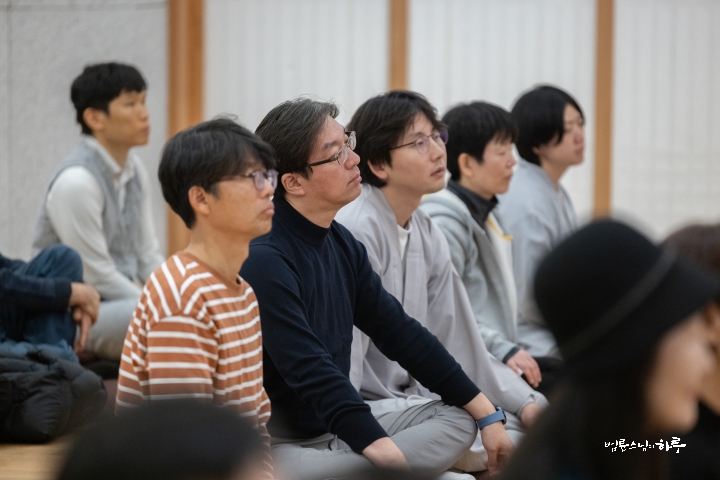
For the next hour, two people asked Sunim questions.
In the Jungto Dharma School’s Practical Buddhist Thought class, the explanation of why we should observe precepts seems to have aspects that don’t align with reality. How should we view cases where the perpetrator actually suffers less?
When I looked at Jungto Society’s plans for the Youth Festival, I feel it doesn’t really address the current concerns of young people. What if we reflected young people’s actual concerns?
After finishing the dialogue, it was past 9 PM. After concluding the assembly with the Four Great Vows, the members of the Sangha sat in circles by group for mindful sharing.
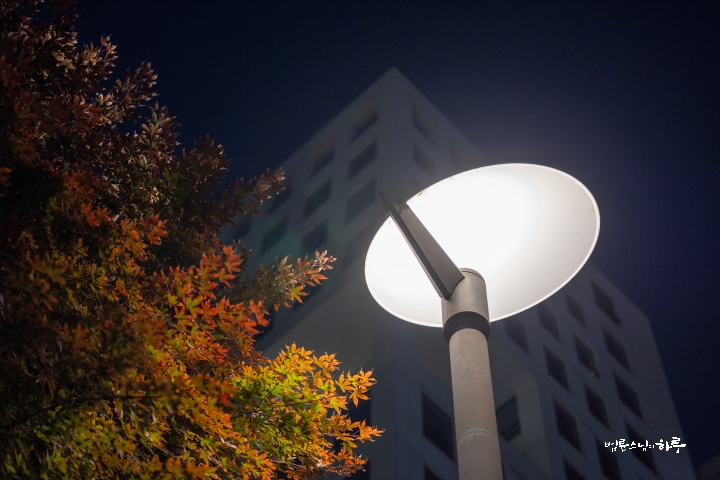
Tomorrow, Sunim will have an early morning breakfast meeting with North Korea experts at The Peace Foundation, followed by a Dharma Q&A at Dongjak District Office. In the afternoon, he will give a Dharma Q&A at Dongguk University, and in the evening, he will attend the Blue Korean Language Collection book celebration with Teacher Choi Han-sil.





